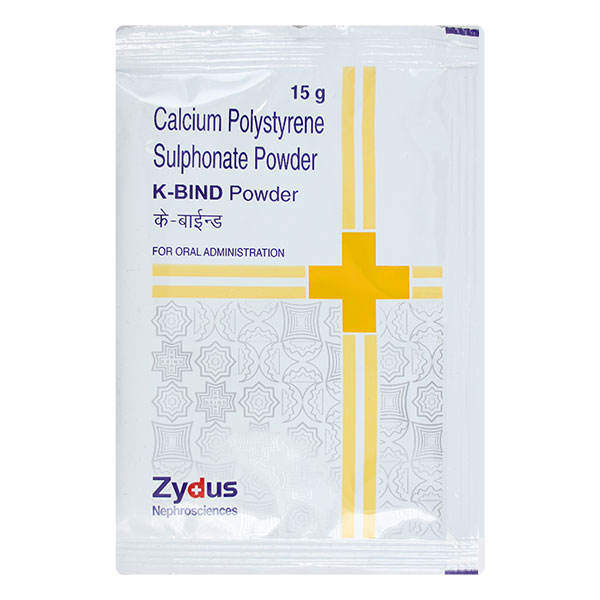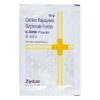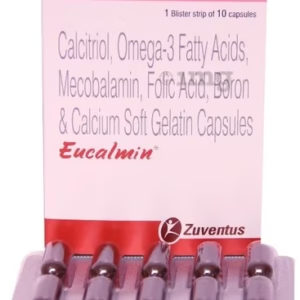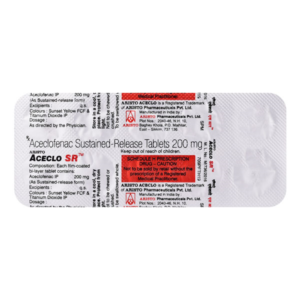Product Highlights
✔ Effectively reduces high potassium levels in the blood
✔ Useful in kidney-related conditions like renal failure or dialysis
✔ Suitable for use in adults and children under medical supervision
✔ Works by binding excess potassium in the intestine and eliminating it via stool
Product Introduction
K Bind Powder contains Calcium Polystyrene Sulphonate, an ion exchange resin used to treat hyperkalemia, a condition of elevated potassium levels in the blood commonly seen in kidney dysfunction. It helps the body eliminate excess potassium by exchanging calcium ions with potassium in the large intestine, which is then passed out with stools.
Key Benefits
🌟 Reduces High Potassium: Binds excess potassium in the gut for elimination
🌟 Kidney-Friendly Action: Beneficial in renal failure, dialysis, anuria, or oliguria
🌟 Improves Heart Rhythm: Helps prevent irregular heartbeat and muscle cramps linked to hyperkalemia
How It Works
K Bind Powder works by releasing calcium ions in the digestive system, which get exchanged for free potassium ions in the large intestine. These potassium ions are then excreted with the stool, effectively lowering blood potassium levels.
Usage Instructions
🕒 When & How to Take It:
-
Take it as directed by your doctor.
-
Do not mix with fruit juices like orange juice, which may increase potassium.
-
Dosage is based on your medical condition and response to treatment.
📌 Missed a Dose?
-
Take it as soon as you remember.
-
If it’s close to your next dose, skip the missed dose. Do not double the dose.
Side Effects
⚠ Common Side Effects:
-
Tiredness, confusion
-
Muscle weakness or cramps
-
Irregular heartbeat
-
Nausea, vomiting, constipation
-
Thirst, frequent urination
-
Abnormal eye movements, convulsions
⚠ Uncommon/Rare Side Effects:
-
Loss of appetite, diarrhea, abdominal pain
-
Stomach ulcer, intestinal obstruction or perforation
-
Hard, dry stool (especially in children using rectal form)
Safety Information
⚠ Precautions:
-
Pregnancy: Use with caution; consult your doctor
-
Breastfeeding: Use with caution; consult your doctor
-
Driving: Avoid driving if you feel dizzy or confused
-
Kidney Disease: Use with caution in chronic kidney disease or dialysis patients
-
Lung/Heart Disease: Use with caution; consult your doctor
-
Allergy: Contraindicated in known allergy to calcium polystyrene sulphonate
-
Children & Elderly: Use with caution in patients <18 or >65 years of age
Good to Know
-
Avoid citrus juices (especially orange) with this medicine
-
May interact with digoxin, thyroxine, lithium, and antacids
-
Always report any severe constipation, stomach pain, or bloody stool to your doctor immediately
-
Ensure adequate hydration during treatment
Quick Tips
💡 Avoid orange juice or potassium-rich food when taking this medicine
💡 Maintain regular blood tests to monitor potassium and calcium levels
💡 Inform your doctor about any bowel surgeries or gut diseases
💡 Do not lie down immediately after taking the dose to prevent choking or blockage
FAQs
❓ What is K Bind Powder used for?
It is used to treat hyperkalemia (high blood potassium levels), especially in patients with renal failure, on dialysis, or with severely reduced urine output.
❓ How does K Bind Powder lower potassium?
It binds with potassium in the intestines and helps remove it from the body through feces.
❓ Can I take it with fruit juice?
No, avoid orange or other potassium-rich fruit juices as they can worsen hyperkalemia.
❓ Who should avoid K Bind Powder?
Avoid if you have intestinal blockage, high blood calcium, or allergy to the drug. Consult your doctor if you have thyroid problems or dehydration.
❓ What happens in case of an overdose?
Symptoms may include confusion, muscle weakness, breathing difficulty, and irregular heartbeat. Seek immediate medical help.
❓ Can children take this powder?
It should be used cautiously and only under doctor’s supervision, especially in preterm or low birth weight infants.







Reviews
There are no reviews yet.